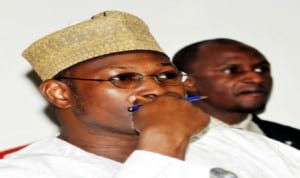Politics
INEC: The Row Over New Polling Units
About six months to the
2015 elections, politicians have began for a attention and relevance and in some cases exchanging political missiles designed to shut down their opponents’ using subtle and direct campaigns even when the umpire, the Independent National Electoral Commission (INEC) has not officially flagged off campaigns. The INEC, which has not denied that there are mistakes and lessons to be learnt from previous conduct of elections especially the last three Anambra, Ekiti and Osun governorship polls, is however, hopeful that it would improve in its subsequent conduct of elections.
This dictates the commission’s decision for constant re-examination to see whether it is still on the path of reforming and improving the electoral process that will promote free, fair and credible elections.
The fallout of INEC’s strategy to reform the electoral process in line with international best practices is the creation of 30,000 polling units(PUs), bringing the total number to 150,000 nationwide from 119,973 that had existed since 1996. Out of the 30,000 PUs, the North got 70 per cent of the new units (more than 21,000 units) while the balance of a little more than 8,000 polling units were allocated to the South. The wide disparity int he collection has therefore sparked up a row. The commission is accused of shortchanging other parts of the country in favour of the North in terms of the new polling units.
The South East region under the aegis of the South East Leaders of the Peoples Democratic Party rejected the recent allocation of the new polling units, describing the allocation as “a gross injustice against Ndigbo.”
“We reject entirely the allocation of polling booths by INEC. We view it as a great disservice to the unity and progress of this country if the entre South will have 8,000 polling booths and the North gets 21,000. We demand that the issue be suspended forthwith. This is a prelude to undermine the interest of the zone in the 2015 elections. It is completely against the spirit of one Nigeria and progress of the country,” the PDP National Publicity Secretary, Olisa Metuh declared while briefing the Press at the end of the zone’s meeting at Abia State Government House, Umuahia.
Ogun State PDP chairman, Bayo Dayo expressed similar dissatisfaction with the allocation of the additional PUs. He is worried about the lopsidedness in the allocation.
He said, “Professor Attahiru Jega is an intelligent and honest man but if his honesty is not in the best interest of the South West, we will react and if need be, we will seek redress in court.”
Though civil rights activist, Comrade Moshood Erubami said it would be premature to fault INEC’s wisdom in the distribution of the PUs when we don’t know the criteria used, Afenifere chieftain, Chief Supo Shonibare agreed that the distribution was lopsided.
“I am not aware that INEC is an authorized body on population census. If it is based on estimate, it is wrong to give a section of the country more polling units at the expense of the other,” Shonibare said.
Another body that did not spare INEC over the allocation of the additional PUs is the Electoral Integrity Network.
Apart from doubting the operations of the commission in the electoral process, the Network was categorical that the exercise was a calculated move to favour certain section of the country, and malign others in the electoral process. The Network which also accused the commission of playing the script of powerful political individuals, also insisted that INEC’s new move is capable of inducing acrimony and hatred in the system which if not properly managed could trigger off crisis before, during and after polls.
The Plateau State Leaders said the political interest of the State has been undermined by INEC’s new allocation of PUs. In their press statement, the leaders asked the commission to re-visit the exercise as a whole, saying that in the spirit of national unity, no section of the country should be short- changed in any socio-political and economic process.
However, Attahiru Jega-led INEC, while absolving itself of what it called “spurious allegations”, explained the rationale for the creation of the new polling units which it argued were meant to facilitate ease access of voters to polling units in the forthcoming elections. INEC also justified the current move from past exercise and structure.
How did it all start?
The defunct National Electoral Commission of Nigeria (NECON), in 1996, created the present structure of polling units. INEC, inherited this structure but in 2010 went further to verify them and their locations. It ascertained a total of 119,973 units. Quite revealing was the fact that substantial number of the identified PUs are located in public buildings (primary and secondary schools, recreation centres/packs, community halls etc). Yet, there are some other PUs located in public open spaces (village /town/market squares, community grounds) and the remaining ones located in the premises of traditional rulers, places of worship, frontage of private houses, compounds etc).
The decision to align with global best practice, the electoral body argues, informed its plan to situate polling units within enclosures in public institutions and buildings, and where this is not possible, in places where tents / canopies’ can be erected for greater convenience of everyone involved in the electoral process.
When the current polling units were put to use in 1996, the estimated population of Nigeria was put at about 110 million, and by 2011, when INEC conducted the general voters registration exercise, the population was estimated at 160 million. Presently, this figure has grown to an estimate of 175 million.
Apart from the issue of population growth, INEC’s move may have been influenced by “severe demographic shifts”. According to INEC advertorial, there has been a notable growth in the number and sizes of new settlements across the country, especially in urban centres.
INEC argues that the reconfiguration of the PUs is apparently a strategy to break large polling units into manageable structures known as voting points and this increased the number from the present 119,973 units to 150,000 PUs. Under this arrangement, large polling units are disaggregated into multiples of 300 registered voters per voting point-with a polling unit having multiples of voting points, depending on the overall population of voters. The voting points are not autonomous units, per se; they remained integral to respective polling units.
The usage of these units may have elicited suspicions from interest groups and some political parties who accused the electoral body of secret agenda in the operations of the units. Whereas the electoral law provides for every political party to have one polling agent each at a PUs, some parties demanded to have polling agents at every voting point.
Also significant is the decision of the INEC to increase the technology content of the electoral process. For the 2015 elections, the commission intends “to use chip-embedded smart-card (as voter cards)and companion smartcard readers. Using the voting points as presently constituted, the commission said it will “require some 250,000 units of the smartcard readers to operate.” This has high cost implication to the economy.
As far as addressing electoral challenges are concerned, INEC believes that reconfiguration of the polling units is the answer, and the guiding principles for the reconfiguration include that polling units will now be located as much as possible in enclosure such as classrooms and halls of public schools, institutions, community centre, town halls, and where they are to be situated in open spaces, tents or canopies will be erected.
Furthermore, a public institution that accommodates more than one polling unit will be designated as a polling station and polling units will be located within a reasonable distance to voters at least a maximum radius of one kilometer in urban areas and two kilometers radius in rural areas. Each polling unit will have a maximum of 500 registered voters.
Proportional distribution of the newly created 150,000 polling units, however, shows that Lagos state has the highest number with 2,870 to bring the total number of its polling units to 11,565 to serve its 5,426,391 registered voters, while Kano State with 4,751,818 registered voters got additional 2,053 polling units to bring its total number to 9,809. Kaduna State, with registered voters of 3,743,815 benefitted additional 2,878 polling units to bring the total number of polling units in the state to 7,485. Bayelsa State, which has the lowest voting strength of 590,679 in the country got additional 121 polling units, making a total of 1,925 voting centres in the state.
The concern of the critics over of the allocation of additional 21,000 polling units to the North as against 8,000 allocated to the South may have been prompted by unsavory reports emanating from polling units during electoral activities.
A member of Delta PDP, Col Joseph Achuzia (rtd), described INEC’s allocation of the new PUs as illogical and wondered the rationale behind the move. The inference from the INEC move, he said, is that majority of the voters in the country are in the North, whereas the cleaning up of the voters register done recently by INEC has belied that notion.
He recalled that enumerators who registered voters in the North usually based their figures on estimates by virtue of their inability to get into certain areas to carry out the national assignment because of Islamic restriction. According to him, this Northerners always use the Islamic restriction as an excuse to stage-manage enumerations in their favour.
The decision of the electoral commission may sound logical especially when it is viewed against the background that the new polling units were previously known as voting points and were appendages of existing polling units. What this means is that INEC only acted from existing structures. But the people have the right to know the details of the reconfiguration so as to rebuild their confidence that were shattered overtimes by previous electoral mistakes.
On its part, the electoral body should consider it necessary to embark on massive sensitization and enlightenment programme for the citizens to allay their fears and educate them that its move has best intentions to ease the logistic challenges confronting electoral activities.
Another option of defence open to INEC in the creation of more polling units is the 2010 Electoral Act which provides that each polling units shall not have more that 500 voters. The need to comply with the provision of the Act, it would be argued, puts the commission on a sound footing for its action.
Samuel Eleonu
Politics
Fubara Tasks Rivers Stakeholders On Political, Economic Emancipation …Commissions NAVAL Training Command Headquarters At Ebubu

Rivers State governor, Sir Siminalayi Fubara, has stated that the task of emancipating Rivers State and taking it to its desired height of development among the comity of Nigerian states depends on the concerted efforts of all stakeholders in the state.
Governor Fubara said this at Ubima, on Saturday, when he attended the burial ceremony of late Madam Cecelia Omehia, mother of Sir Celestine Omehia.
Addressing the leaders of the state who attended the burial ceremony in their numbers, the governor urged them to demonstrate their love for the state by living up to their patriotic responsibilities and make meaningful contributions that will move the state forward.
Governor Fubara reaffirmed his commitment to the service of the state and cautioned against politics of bitterness and animosity, stating that he will not govern the state as an underdog, nor compromise the interest of Rivers people, no matter the challenges facing his administration.
“Anybody who claims to love this State should not be party to anything, directly or indirectly, that will bring us backwards. We will continue to support every course that will advance the interest of our dear Rivers State.
“And I am happy to say, and I’ve said it over and again, it doesn’t matter the number of people that are standing with me, I will stand on the side of truth.
”I will not, I repeat, I will not govern our dear State on my knees. If that was the purpose, I will not do that. I will stand to govern our dear state and stand continually on the side of right”, he said.
The governor commiserated with the Omehia family over the transition of their beloved matriarch and urged them to take solace in the good legacies she left behind.
Sir Celestine Omehia, the chief mourner, in his response thanked the Rivers State governor and his entourage for honoring the memory of his beloved mother, whom he described as a role model, teacher and great disciplinarian.
Earlier on Saturday, Governor Fubara visited the scene of the Friday night inferno occasioned by a tanker explosion that occurred at the Indorama axis of East West Road, causing untold disaster with over 60 vehicles razed and about four lives lost.
Governor Fubara who was accompanied by the Commissioner of Police in Rivers State, Olatunji Disu, and the state Commissioner for Energy and Natural Resources, Mr Uchechukwu Nwafor, during the visit, expressed deep concern over the unfortunate incident and condoled with the families of the victims, assuring that the state government will provide needed assistance to cushion the effects of the tragedy.
“We are here to see for ourselves and get a first hand information of what happened yesterday night.
“I was told that it was caused by a tanker that was conveying premium motor spirit. In fact, I got the information through the MD of Indorama, and I immediately alerted the security agencies to make sure they take control of the security situation in the area.
Governor Fubara, on Friday, commissioned the new Naval Training Command Headquarters at Ebubu, Eleme Local Government Area of Rivers State.
Speaking at the event, Governor Fubara said he was delighted with the transformation recorded in the abandoned facility after it was ceded by the Rivers State Government to the Nigerian Navy on request in 2023.
He pointed out that the relocation of the Naval Training Command headquarters to Rivers State underscores the proficiency of the Nigerian Navy in managing the maritime sector, especially in safeguarding the waterways and fighting against economic sabotage such as crude oil theft and its associated menace.
Governor Fubara commended the Navy for investing in the training of its personnel to evolve a highly skilled workforce to secure the Nigerian waterways, stating that the new development is a manifestation of President Bola Tinibu’s commitment to building a strong security architecture for Nigeria.
The Governor who assured the support of his administration to the Navy and other security outfits, announced a donation of N350m to the Navy, and urged synergy between the Navy and the host communities in terms of development support and security of lives and property.
“As you go on to put this training command into full service, my charge to you is to ensure that this sprawling facility is effectively maintained and utilized to expand your operations and activities for national security development.
“I further implore you to provide effective security and development support to the host communities, and live in peace and harmony with the civilian population in the local government area,” the Governor added.
In his remark, the Chief of Naval Staff, Vice Admiral, Emmanuel Ogalla, expressed gratitude to the Governor for the continuous support and partnership of the Rivers State Government with the Navy.
Taneh Beemene
Politics
Constitution Amendment: Senator Barau Urges Stakeholders’ Collaboration
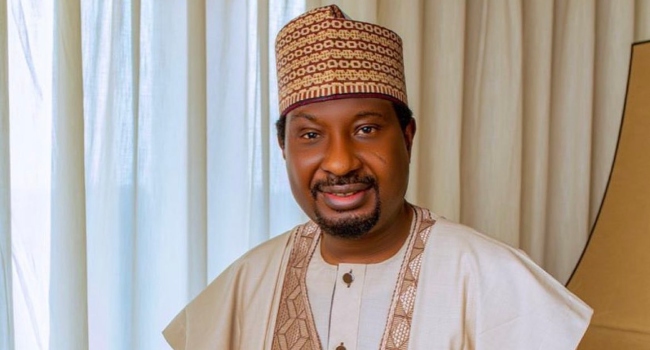
Deputy President of the Senate and Chairman of the Senate Committee on the Review of the Constitution, Senator Barau Jibrin, has called for robust collaboration among all stakeholders to drive the ongoing constitution amendment process to a successful conclusion.
Senator Barau stated this on Saturday at the joint retreat of the secretariat and consultants to the Senate and House of Representatives committees on the review of the Constitution of the Federal Republic of Nigeria 1999, in Abuja.
He commended the synergy between the constitution review secretariat and consultants to the Senate and House of Representatives committees, saying this will create harmony in the workings of both committees.
Senator Barau assured that the National Assembly will carry out the review of the constitution by a thorough aggregation of the yearnings of Nigerians from all walks of life through public hearings and collection of memoranda from various interests throughout the country, as well as embarking on a progressive engagement with state governments and legislatures and the federal government to achieve consensus on all issues.
“We must work together. Our country is facing a lot of challenges and this is the right time to fashion out a constitution that will go in line with the wishes and aspirations of the people of this country.
“The world is dynamic and this compels all serious countries to go with modernity and fashion their laws in accordance with contemporary happenings within their peculiarities.
“We have started on a progressive note of collaboration and let us add momentum to this very important collaboration within our ranks in order to achieve a result that will help in driving the process of making prospective peace, justice and fair play in the way we run our affairs as a nation,” he said.
Politics
Makinde Hails Electorate, OYSIEC Over LG Poll Conduct

Oyo State governor, Seyi Makinde, has applauded the residents of the state for turning out to vote in the ongoing local government election across the state.
The governor also rated the conduct of the election high, stating it compared favourably with elections conducted by the Independent National Electoral Commission (INEC).
The governor stated this on Saturday after casting his vote at Unit 1, Ward 011, Abayomi Open Space, Iwo Road, Ibadan North East LGA of Oyo State.
Addressing journalists after exercising his civic responsibility, Gov Makinde said, “For us in Oyo State, it is almost like a given that democracy at the grassroots is what we practise. This is almost our fifth year in office and we are holding local government election for the second time.
“Before we came in, it had always been caretaker administration at the grassroots without the people having a say in who should govern them.
“You can see around also that the people are going about, performing the exercise peacefully and the traffic restriction is being obeyed by the people. So, I will commend our people for coming out to take seriously democracy at that level.”
The governor, who noted that security report about the election had been excellent, also charged those who observed any untoward development to report same to the security agencies.
-
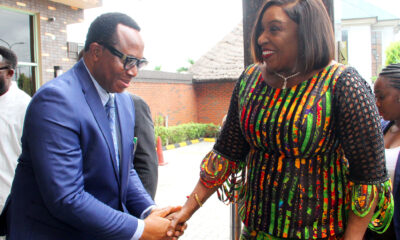
 News5 days ago
News5 days agoFubara Tasks GPDA On Prosperous, Liveable City
-

 Environment5 days ago
Environment5 days agoWED:Activists Task Govt On Plastic Pollution, Synophom Ban
-
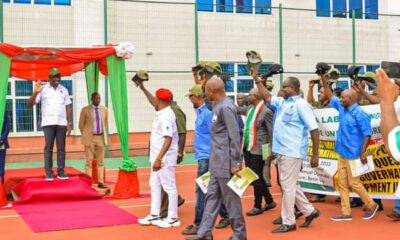
 Niger Delta17 hours ago
Niger Delta17 hours agoObaseki Approves N70,000 Minimum Wage For Workers
-
Business5 days ago
NCDMB, SON Maintain Lead In Business Efficiency Ranking
-
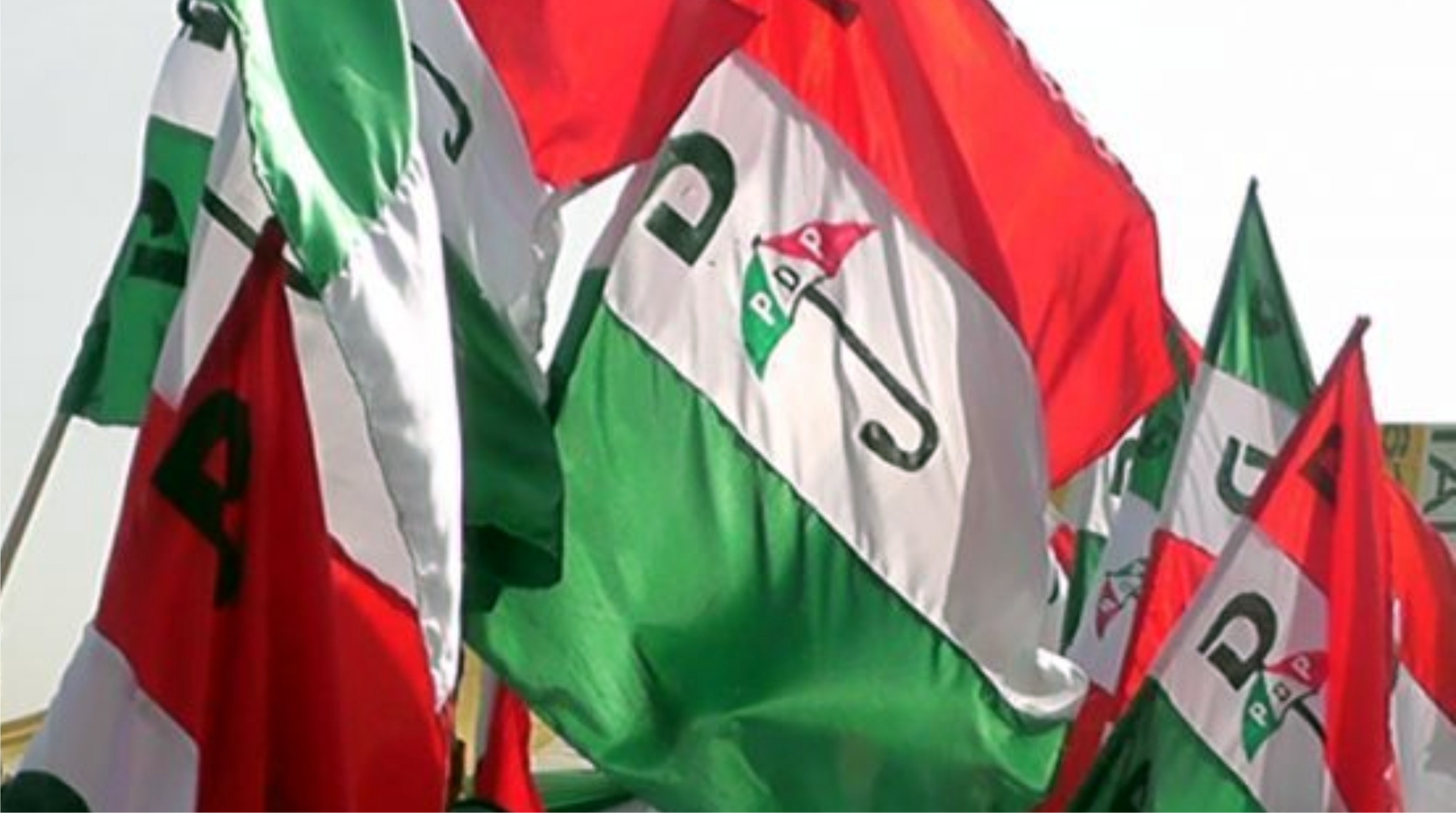
 Niger Delta5 days ago
Niger Delta5 days agoEdo: PDP Unveils 200-Member Campaign Council For 2024 Poll
-
Sports4 days ago
Chess Championship: Dan-Jumbo Emerges Best Female Player
-
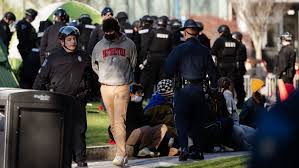
 Foreign5 days ago
Foreign5 days agoPolice Detain Scores Of US Varsity Students Over Protest
-

 Oil & Energy5 days ago
Oil & Energy5 days agoRenewable Energy Boom With Waste Problem

